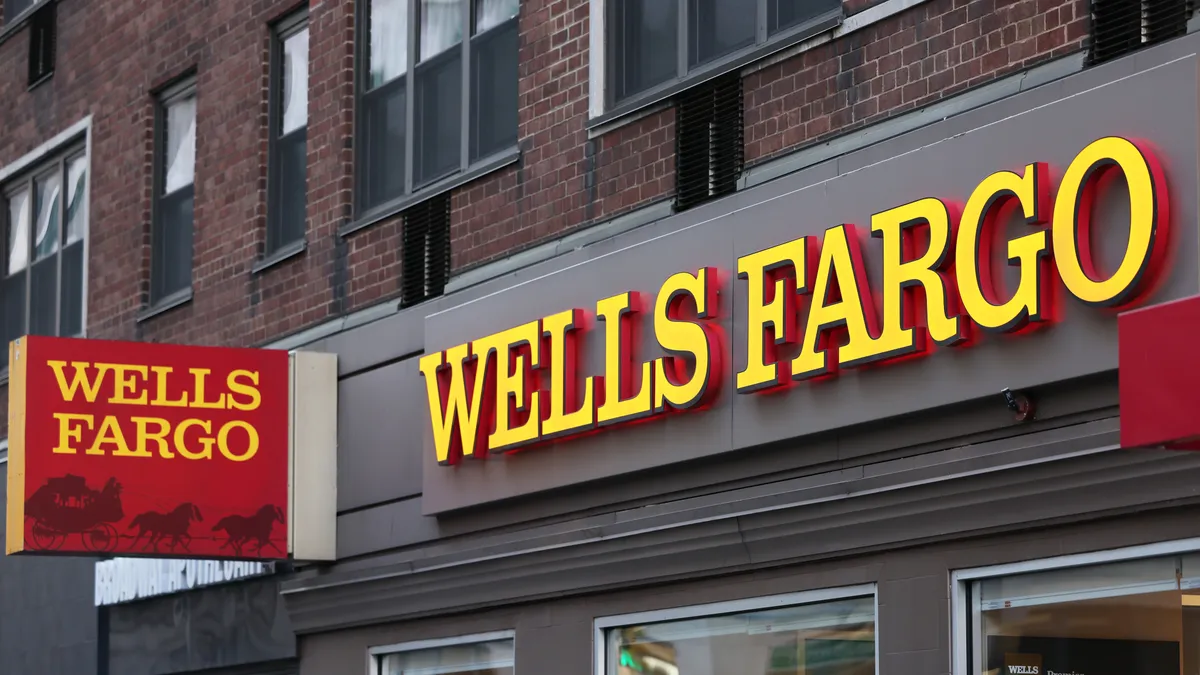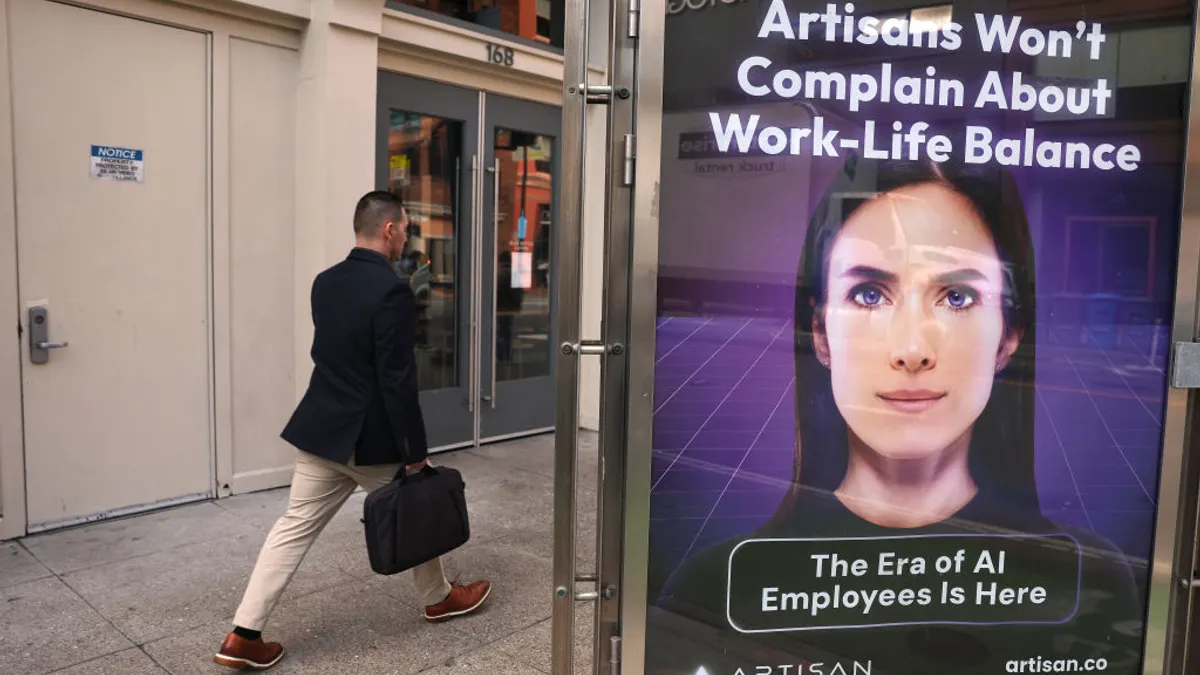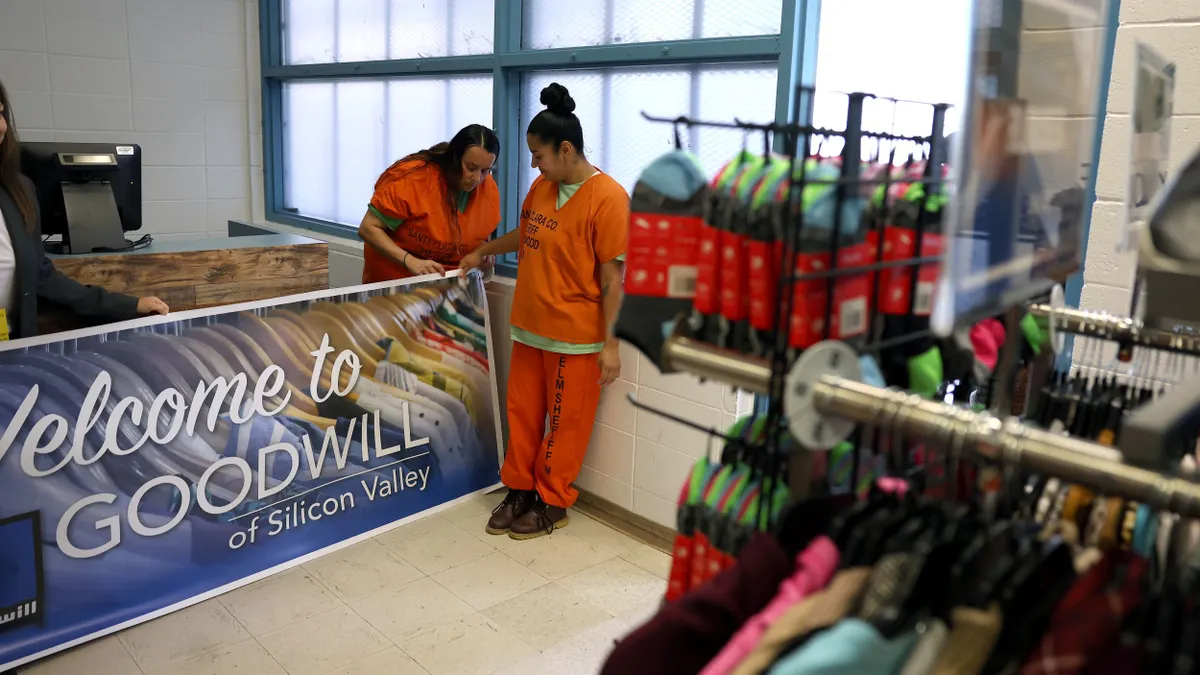Workers at two Wells Fargo branches in Albuquerque, New Mexico, and Bethel, Alaska, filed a petition Monday with the National Labor Relations Board, indicating they plan to hold elections to join the Communications Workers of America’s Wells Fargo Workers United.
“I've worked at Wells Fargo for nearly 10 years, and in the seven years since the fake-account scandal, three CEOs have promised change and failed to deliver,” Sabrina Perez, an Albuquerque-based senior premier banker at Wells Fargo, said in a press release Monday seen by Banking Dive. “We are joining together in a union in order to improve Wells Fargo's culture and move the bank toward a brighter future where workers and customers are treated equitably and with respect.”
Perez told The Wall Street Journal on Monday that she and her colleagues began talking seriously about unionization because bankers in her branch were pulling double duty as tellers, and customers complained of long wait times. But when workers raised their concerns to management, they were told nothing would be done, Perez said.
Some employees who left the branch at the beginning of the COVID-19 pandemic had not been replaced, Perez said.
“The executives don’t have to deal with the consequences of their decisions in a direct sense, but we do,” she told The Wall Street Journal.
In a statement to the Journal, Saul Van Beurden, Wells Fargo’s CEO of consumer and small-business banking, said the bank has “reduced the required workdays for those in many of our branches, and increased staffing levels in branches where needed to help support our employees and ultimately our customers.”
Lawmaker attention
Union participation among finance-sector employees is exceedingly rare, compared with other sectors. While 10% of the U.S. workforce was part of a union last year, that proportion dips to 1.3% in finance, according to data from the Bureau of Labor Statistics.
The efforts of Wells Fargo employees to unionize has gained sporadic attention over the past several months. Members of Wells Fargo Workers United urged the bank’s shareholders in April to pass a policy recognizing workers’ rights to organize, bargain and form a union. The measure, which garnered 36% shareholder support, was deemed “unnecessary and not in the best interests of our employees or shareholders,” according to a proxy statement.
But Senate Banking Committee Chair Sherrod Brown, D-Ohio, asked the Federal Reserve and Office of the Comptroller of the Currency last month to investigate allegations of labor abuse by Wells Fargo, with respect to employees’ unionization efforts.
Brown cited a spate of charges Wells Fargo employees have filed with the NLRB, including some by employees in Arizona and Iowa, who claimed in September that supervisors at the bank retaliated against employees who were organizing union efforts. Months earlier, the bank and the NLRB reached an informal settlement after a manager allegedly threatened an employee who was distributing pro-union literature to co-workers at a Salt Lake City call center, according to Bloomberg Law.
“Regulators should take stronger actions to change Wells Fargo’s culture of noncompliance and account for the troubling unfair labor practice allegations that could be the bellwether for broader safety and soundness and consumer compliance risks,” Brown wrote in an October letter to acting OCC chief Michael Hsu and Michael Barr, the Fed’s vice chair for supervision.
The power of voice
A Wells Fargo spokesperson told Banking Dive in April — and again in May — that the bank “respect[s] employees’ rights under the National Labor Relations Act and our policies do not prohibit employees from discussing wages, benefits and terms of employment, or otherwise engaging in collective activity.”
The bank, however, “believes our employees are best served by working directly with the company and its leadership — not a third-party group like a union — to address matters of concern,” the spokesperson said.
Since then, the bank posted a job opening for a labor relations director, Bloomberg Law reported.
Meanwhile, more than 1,000 Wells Fargo workers have signed on to the union campaign, according to the Committee for Better Banks.
“A missing element of getting Wells Fargo to repair its tattered reputation is to give workers a voice,” Nick Weiner, organizing director for the Committee for Better Banks told The Wall Street Journal.
Van Beurden, in his statement, said Wells Fargo “strongly believe[s] everyone’s individual voice should be heard and that direct connection is the best way to continue to make progress in ensuring that our workplace helps our employees thrive.”
Pay also is a top concern among Wells Fargo employees involved in unionizing efforts. Walker Sexton, a personal banker at Wells Fargo’s Bethel branch said that although the bank increased hourly pay for some workers, his pay was kept level.
“Wells Fargo profits billions of dollars every year. The bank shouldn’t have employees on public assistance, and I shouldn’t have to work two jobs to get by,” Sexton said in a press release. “Instead of investing in us and our communities like we were promised, Wells Fargo is forcing our customers online and leaving behind those who can’t access the bank’s digital self-service tools.”
Van Beurden, for his part, said the bank has increased median base salaries by 26% over the past four years for employees making less than $50,000.





















